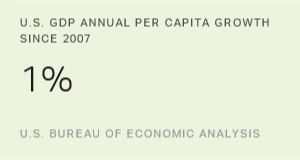This article is the second in a series on economics and governance in Nigeria.
WASHINGTON, D.C. -- Governments throughout sub-Saharan Africa are implementing reforms to improve the business climate within their countries. A Gallup Poll conducted in Nigeria shows that 67% of Nigerians have thought of starting a business -- one of the highest rates in West Africa.
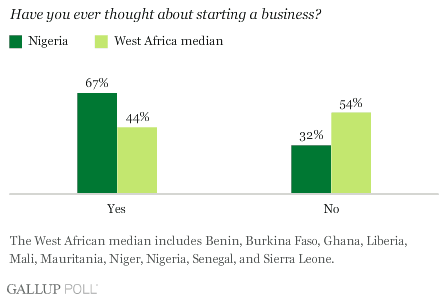
Compared with other countries in West Africa, where the median percentage of respondents who say that they have thought of starting a business is 44%, the Gallup Poll suggests relatively high interest in entrepreneurship in Nigeria. Moreover, almost one-half (45%) of Nigerians say they plan to start a business in the next 12 months, suggesting a significant percentage of respondents have firm plans. Additionally, most Nigerians (80%) are very confident that a newly created business will do well in their country.
Profile of a Nigerian Entrepreneur
Some demographic groups are more likely than others to exhibit entrepreneurial spirit. Nigerians who say they have a job, whether paid or unpaid, are far more likely than those who don't have a job to express an interest in starting a business, 77% versus 53%, respectively. Seventy percent of Nigerians aged 19 and older say they have thought of starting a business, compared with 44% of those aged 15 to 18 who say the same.
Nigerian women (67%) are as likely as Nigerian men (68%) to say they have entertained the idea of starting a business. And when considering education levels, Nigerians with some university level education are as likely as those with a primary education or less to have considered starting a business.
For most Nigerians surveyed, their potential business would be an informal venture: 69% of respondents say the business they have in mind would not be formally registered, and just 19% say their business would be formally registered. Men (24%) are slightly more likely than women (15%) to say they would register a future business. Additionally, Nigerians with some university level education are far more likely (37%) than those with a secondary education (22%) or less (12%) to say their business would be registered.
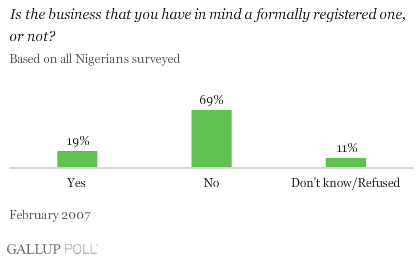
Gallup also looked at perceptions of social networks in the context of entrepreneurship. A slight majority of Nigerians (53%) say they know someone, exclusive of their relatives, whom they could trust enough to make that person a partner in a business startup. Men (57%) are slightly more likely than women (49%) to express such trust in non-relatives.
Opportunities and Obstacles to Entrepreneurship
There are both opportunities and obstacles to entrepreneurship in Nigeria's business climate, which could influence a citizen's decision whether to start a business. On the one hand, the Gallup Poll findings show that Nigerians are confident in the availability of a qualified workforce, the protection of property rights, and the likelihood of financial success. Three-quarters of respondents say that an entrepreneur can feel confident that he or she will find hardworking and qualified employees when necessary. Nigerians also express relatively high levels of confidence that business assets and property would be safe at all times (60%). Furthermore, 58% of respondents trust the government will let entrepreneurs make a lot of money.
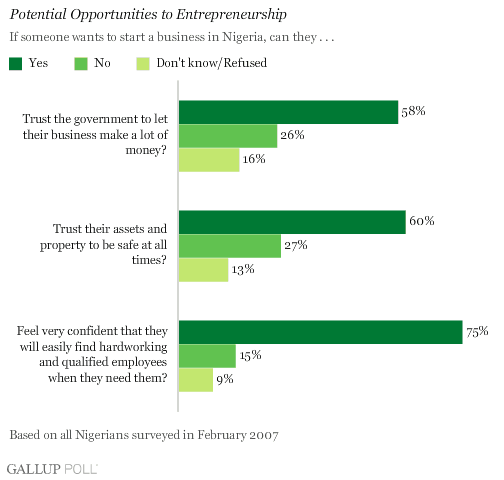
On the other hand, the poll findings put a spotlight on three important obstacles to entrepreneurship in the country. Almost three-quarters of Nigerians (73%) say it is not easy to obtain a loan. A majority of Nigerians (59%) also say that the government does not make the filing process easy enough for anyone who wants to start a business. Additionally, Nigerians are mixed on the constancy of the business regulatory environment. Forty-four percent of respondents say an entrepreneur can feel very confident that tax laws and other rules of the game will not change all the time, but 33% think they will change.
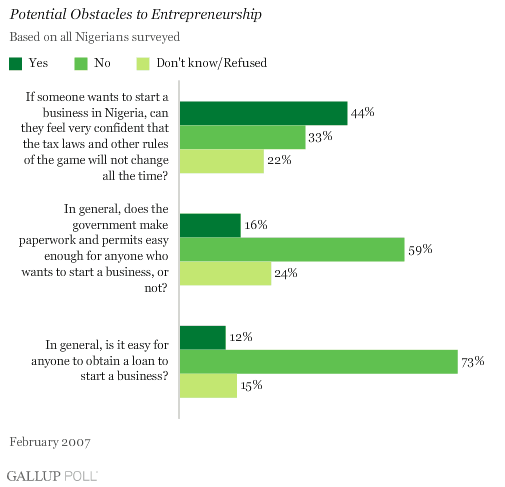
Taken together, the Gallup Poll findings suggest that Nigerians have a relatively strong drive for entrepreneurship. Many respondents believe that key elements of a strong business climate are present. However, as access to credit, the filing process, and other important indicators are perceived as obstacles to entrepreneurship, this may explain why most Nigerians don't intend to register their potential business.
Furthermore, the relatively high percentages of "don't know" responses with respect to the filing process and the regulatory business environment suggest that many Nigerians are either unaware of the national government's efforts to simplify the business start-up process or that further reforms are necessary.
Survey Methods
Results are based on face-to-face interviews with 1,000 adults, aged 15 and older, in Nigeria in February 2007. For results based on the total sample of national adults, one can say with 95% confidence that the maximum margin of sampling error is ±5 percentage points. In addition to sampling error, question wording and practical difficulties in conducting surveys can introduce error or bias into the findings of public opinion polls.